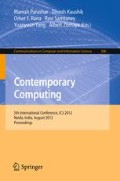Abstract
Predicting strength of a relationship (also known as Tie Strength Problem) has been a trivial research area amongst sociologists for decades. However, considering the recent trends in internet behavior of people along with the development of so called social web, makes it popular amongst web scientists to work on this as a potential research topic with new perspectives. Real life is a complex social dynamic system comprising individuals starting of either as strong acquaintances or weak acquaintances and move towards strong or weak ties with passage of time. In this paper we validate the existence of varying degree of relationship individuals have on Facebook using unsupervised machine learning techniques like divisive hierarchical clustering and statistical techniques like SSE ; analyzing strength of the boundaries that distinguish them. We have realized this on a feature rich dataset of more than 100 nodes collected during 10th of July, 2011 to the 9th of September 2011 using a Facebook application. We provide descriptive error analysis interviews focussing on the clustered structure, obtaining it with an accuracy of 90%. The paper concludes by illustrating how modeling tie strength can improve social media design elements, including privacy controls, message routing and information prioritization in databases. Potential usage of this work can be in making complex recommender systems, lead generation marketing and in organizational or telecom network.
Access this chapter
Tax calculation will be finalised at checkout
Purchases are for personal use only
Preview
Unable to display preview. Download preview PDF.
References
Backstrom, L., Leskovec, J.: Supervised random walks: predicting and recommending links in social networks. In: 4th WSDM, WSDM 2011 (2011)
Brock, G., Pihur, V., Datta, S., Datta, S.: clvalid: An r package for cluster validation. Journal of Statistical Software 25(4), 1–28 (2008)
Burt, R.S.: Structural Holes: The Social Structure of Competition, vol. 58. Harvard University Press (1992)
Burt, R.S.: Structural holes and good ideas. American Journal of Sociology 110(2), 349–399 (2004)
Domingos, P., Richardson, M.: Mining the network value of customers. In: Proceedings of the Seventh ACM SIGKDD International Conference on Knowledge Discovery and Data Mining, KDD 2001 (2001)
Dunn, J.C.: Well separated clusters and optimal fuzzy-partitions. Journal of Cybernetics 4, 95–104 (1974)
Espinoza, F.A., Oliver, J.M., Wilson, B.S., Steinberg, S.L.: Using hierarchical clustering and dendrograms to quantify the clustering of membrane proteins. Bulletin of Mathematical Biology (2011)
Gilbert, E., Karahalios, K.: Predicting tie strength with social media. In: 27th HFCS, CHI 2009 (2009)
Granovetter, M.S.: Getting a job: A study of contacts and careers. University of Chicago Press (1995)
Granovetter, M.S.: The strength of weak ties. American Journal of Sociology, 1360–1380 (1973)
Handl, J., Knowles, J., Kell, D.B.: Computational cluster validation in post-genomic data analysis. Bioinformatics 21 (August 2005)
Hansen, M.T.: The search-transfer problem: The role of weak ties in sharing knowledge across organization subunits. Administrative Science Quarterly 44(1), 82 (1999)
Kossinets, G., Watts, D.J.: Empirical analysis of an evolving social network. Science 311(5757), 88–90 (2006)
Lin, N., Ensel, W.M., Vaughn, J.C.: Social resources and strength of ties: Structural factors in occupational status attainment. American Sociological Review 46(4), 393–405 (1981)
Neville, J., Simsek, O., Jensen, D., Komoroske, J., Palmer, K., Goldberg, H.: Using relational knowledge discovery to prevent securities fraud. In: 11th ACM SIGKDD, KDD 2005 (2005)
Rousseeuw, P.: Silhouettes: a graphical aid to the interpretation and validation of cluster analysis. J. Comput. Appl. Math. 20 (November 1987)
Schaefer, C., Coyne, J.C., Lazarus, R.S.: The health-related functions of social support 4(4), 381–406 (1981)
Tichy, N.M., Tushman, M.L., Fombrun, C.: Social network analysis for organizations. Academy of Management Review 4(4) (1979)
Wellman, B., Wortley, S.: Different strokes from different folks: Community ties and social support. American Journal of Sociology 96(3), 558–588 (1990)
Xiang, R., Neville, J., Rogati, M.: Modeling relationship strength in online social networks. In: 19th WWW, WWW 2010 (2010)
Zhao, J., Wu, J., Feng, X., Xiong, H., Xu, K.: Information propagation in online social networks: a tie-strength perspective
Author information
Authors and Affiliations
Editor information
Editors and Affiliations
Rights and permissions
Copyright information
© 2012 Springer-Verlag Berlin Heidelberg
About this paper
Cite this paper
Kumar, A., Rao, T., Nagpal, S. (2012). Using Strong, Acquaintance and Weak Tie Strengths for Modeling Relationships in Facebook Network. In: Parashar, M., Kaushik, D., Rana, O.F., Samtaney, R., Yang, Y., Zomaya, A. (eds) Contemporary Computing. IC3 2012. Communications in Computer and Information Science, vol 306. Springer, Berlin, Heidelberg. https://doi.org/10.1007/978-3-642-32129-0_23
Download citation
DOI: https://doi.org/10.1007/978-3-642-32129-0_23
Publisher Name: Springer, Berlin, Heidelberg
Print ISBN: 978-3-642-32128-3
Online ISBN: 978-3-642-32129-0
eBook Packages: Computer ScienceComputer Science (R0)

